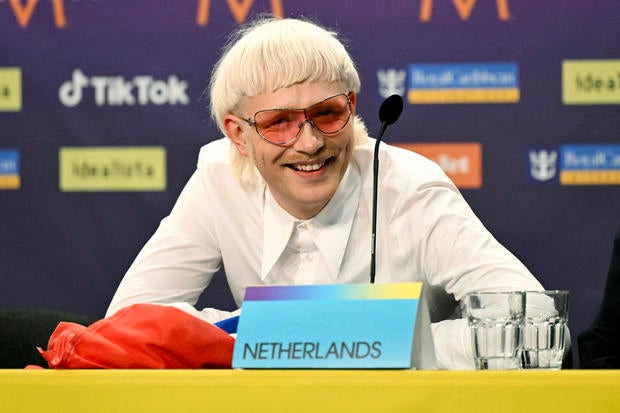Swiss singer Nemo triumphed at the 68th Eurovision Song Contest, securing victory with their powerful anthem “The Code.” This operatic track, celebrating Nemo’s journey of self-discovery and non-binary identity, resonated with both juries and viewers worldwide, propelling them to the top of the leaderboard. Nemo’s win, however, occurred against a backdrop of significant turmoil and controversy, making the 2024 Eurovision event in Malmo, Sweden, one of the most politically charged in recent memory.
Nemo’s captivating performance outshone strong competition, notably Croatia’s Baby Lasagna, who finished as runner-up. Upon receiving the coveted glass microphone trophy, Nemo expressed gratitude and voiced a poignant hope that Eurovision could “live up to its promise and continue to stand for peace and dignity for every person.” This statement subtly acknowledged the undercurrent of tension that permeated this year’s contest.
 Dutch Eurovision contestant Joost Klein at a press conference before being expelled from the Eurovision Song Contest 2024 in Malmo, Sweden.
Dutch Eurovision contestant Joost Klein at a press conference before being expelled from the Eurovision Song Contest 2024 in Malmo, Sweden.
The celebratory atmosphere in Malmo was heavily diluted by widespread protests triggered by Israel’s participation in the Eurovision Song Contest. For days leading up to the final, thousands of pro-Palestinian demonstrators flooded the streets of Malmo, a city with a significant Muslim population. These protests, some of which saw confrontations with police and even the involvement of climate activist Greta Thunberg, called for a boycott of Israel and an immediate cease-fire in the ongoing conflict in Gaza. The protesters argued that Israel’s presence in a contest themed around unity and music was insensitive given the humanitarian crisis in Gaza. The shadow of the seven-month war, which has resulted in a devastating number of Palestinian casualties, loomed large over what is typically a lighthearted and unifying event.
Adding to the chaos, just hours before the grand final, Dutch contestant Joost Klein was abruptly disqualified from the competition. This unprecedented move by Eurovision organizers stemmed from an alleged backstage altercation, which is currently under police investigation. Details surrounding the incident remain unclear, but Dutch broadcaster AVROTROS vehemently protested the expulsion, deeming it “disproportionate.” Klein, a popular figure with fans and bookmakers alike for his song “Europapa,” was notably absent from the final, further dampening the mood and fueling speculation and disappointment among viewers.
Despite the controversies, the Eurovision Song Contest still delivered its signature blend of musical diversity and spectacular performances. Finalists from 25 countries showcased a wide array of genres, from rock and disco to techno and folk-pop fusions. Ukraine’s emotional performance by alyona alyona & Jerry Heil with “Teresa & Maria” served as a poignant reminder of the ongoing war in their country, while other acts like Finland’s Windows95man offered lighter, more eccentric entertainment. Ireland’s Bambie Thug incorporated gothic elements and summoned a demon on stage, and Spain’s Nebulossa delivered a powerful message of female empowerment with “Zorra.”
Eurovision’s motto, “united by music,” felt particularly strained this year. While the event aims to celebrate European diversity and inclusivity, particularly within the LGBT community, the political realities of the Gaza conflict and the internal disruptions overshadowed the intended message. Even as former Eurovision winners like Charlotte Perrelli, Carola, and Conchita Wurst performed ABBA’s iconic “Waterloo,” the celebratory spirit felt somewhat muted.
The return of Eurovision to Sweden, 50 years after ABBA’s historic win, was meant to be a jubilant occasion. However, the 2024 contest will likely be remembered not just for Nemo’s historic win as the first non-binary victor, but also for the intense political and social undercurrents that challenged the very essence of Eurovision’s unifying ideals. The events in Malmo served as a stark reminder that even a contest built on music and entertainment cannot be entirely divorced from the complexities and conflicts of the real world.
